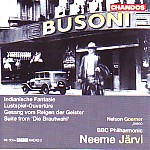Like his beloved predecessor Liszt, only more so, Busoni created music that often is more interesting as a concept than for any successful sonic realization of its initial premises. Busoni did manage to squeeze out one orchestral masterpiece, the massive Piano Concerto, but otherwise his orchestral works display real liabilities. The first of these is a pervasive grayness of texture that occasional flashes of coloristic brilliance, such as prominent glockenspiel passages or the sporadic bit for harp, do nothing to mitigate. Second, Busoni seems to have suffered from what can only be called a poor sense of musical timing. For example, the Lustspiel-Ouvertüre seems to be building to a deliciously witty ending but stops before it gets there. Similarly, the Indianische Fantasie peters out most disappointingly after working up to what ought to be an exciting conclusion.
Finally, Busoni’s thematic material is seldom memorable. It’s no mistake that his most popular pieces all borrow tunes from other composers, whether Bach or Bizet. Even here, though, there’s no guarantee of success. Gesang von Reigen der Geister, another piece based on Native American music that’s also one in the seemingly endless series of “Elegies” that obsessed Busoni throughout his life, meanders desultorily. The Fantasie never gets beyond the realm of pastiche: evocative folk melodies alternate with spasmodic outbursts of Lisztian virtuosity from the piano soloist. At one point, the latter’s Totentanz flashes past, and the work comes off more as a reflection of Busoni’s omnivorous musical intellect than as a coherent piece of music on its own.
The Suite from Die Brautwahl suffers from all of these debilities. It really gets going in the finale, but otherwise it drifts about rather aimlessly for much of its 27 minutes. Again, the work promises much (the opera is based on a typically fantastic E.T.A. Hoffmann story), but the music fails to deliver. You can’t really blame the performances, which are typically efficient and professional. Pianist Nelson Goerner is technically nimble, but his tone is dry, with the consequence that his contributions sound even more disconnected from their surroundings than they otherwise might. Still, the fault lies squarely with the composer, not the players, nor the engineers, who manage typically fine sound. I wish this music were better, but it really is more interesting to think about than it is to listen to.
































